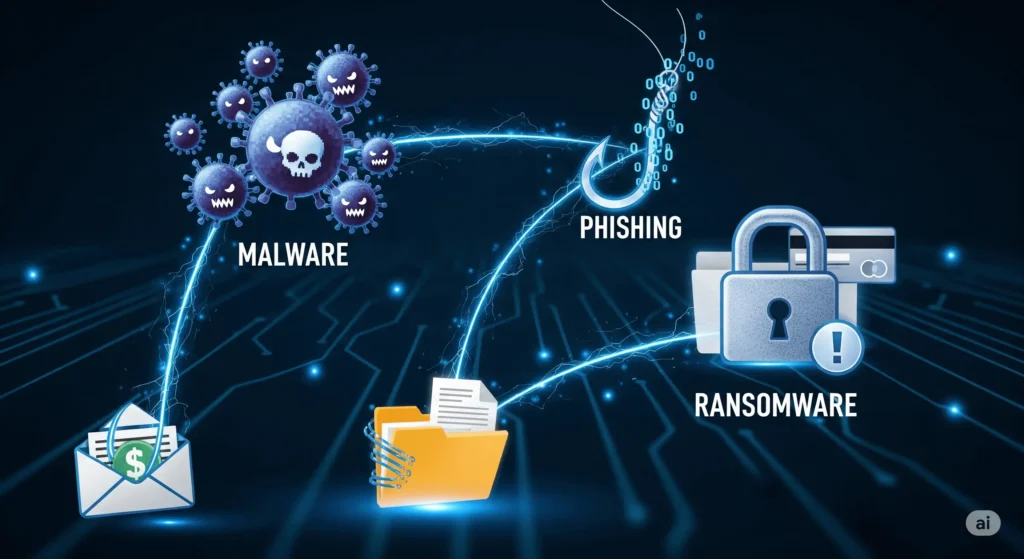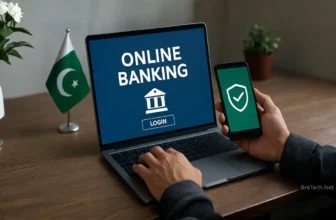Why cybersecurity is important in Pakistan in 2026 becomes clear when a payment is urgent, your banking login looks different, or a file suddenly won’t open. One wrong click can expose accounts, photos, and office data on Windows PCs and phones.
In that panic moment, many people install random “free security” apps, shady browser add-ons, or cracked tools. This often adds more risk, because the fix itself can be unsafe, and attackers get a second chance through the same weak password or link.
A safer approach is simple: update Windows and your browser, enable 2-step verification, and use genuine security software that updates properly. This guide explains real risks in Pakistan and the practical steps that help home users, students, and SMEs stay protected.
Why cybersecurity is important in Pakistan is simple: it protects your passwords, payments, and files from phishing, malware, and ransomware. Start with updates, stronger logins, and one reputable security tool, then buy a genuine license in PKR with local payments and 1-72 hour email delivery from BreTech (authorized reseller in Pakistan).
Why Cybersecurity is Important: Understanding the Basics
What is Cybersecurity?
Cybersecurity protects digital assets and systems from theft, damage, or unauthorized access through various measures against cyber attacks. It acts as a security layer for computers, phones, and networks.
Effective cybersecurity is crucial for safeguarding sensitive data, including personal information and financial records.
These measures aim to maintain data security and ensure business continuity amid security threats. Neglecting cybersecurity can result in significant financial losses and reputational damage for businesses.
Why Cybersecurity is Important in Daily Life
Cybersecurity is essential in our daily lives. Every internet use, from online banking to social media, exposes you to cyber threats.
These threats range from phishing scams that steal passwords to ransomware attacks that lock files and demand payment. Students are also at risk, as shown by recent email hacks targeting university accounts.
Strong cybersecurity measures are vital to protect personal information and prevent identity theft. Neglecting security practices can result in serious personal and financial consequences. Following security awareness training can significantly reduce these risks.
Common Cybersecurity Myths in Pakistan
Common cybersecurity myths in Pakistan can lead to complacency. One myth is that only large organizations are targeted; in reality, individuals and small businesses are equally vulnerable.
Another myth is that antivirus software alone ensures security. While important, it is just one part of a comprehensive strategy that includes security policies, audits, and employee training.
Additionally, many believe cloud security is managed entirely by the provider. Users still need to implement security controls and follow best practices to protect their data.
Types of Cybersecurity Threats

Common Cyber Threats Faced by Individuals
In the digital age, individuals face cybersecurity threats that can compromise their data. Common threats include phishing attacks, where criminals deceive users into revealing personal information, and malware that infects devices to steal data or disrupt operations.
Identity theft is another growing concern, as cyber criminals use stolen information for fraud. To combat these threats, individuals should:
- Use strong passwords
- Enable two-factor authentication
- Be cautious with suspicious links
Cybersecurity awareness training is crucial for maintaining a strong personal security posture against these evolving threats.
Cyber Attacks Targeting Businesses
Businesses face a more complex landscape of cybersecurity threats. Cyber attacks targeting businesses often include several dangerous tactics, such as:
- Ransomware, which encrypts critical data and demands payment for its release.
- Data breaches, where sensitive data is stolen or exposed, leading to financial losses and reputational damage.
- Distributed Denial-of-Service (DDoS) attacks that overwhelm a company’s network.
- Application security vulnerabilities, which, if exploited, can give attackers access to sensitive systems and data.
Addressing these cybersecurity threats requires robust security measures, including firewalls, intrusion detection systems, and regular security audits. Effective cybersecurity is crucial for business continuity and maintaining customer data protection.
Local Examples: JazzCash Scams and Student Email Hacks
Pakistan faces unique cybersecurity threats, such as JazzCash scams where fraudsters trick users into revealing account details. These scams often use social engineering tactics. Student email hacks are also common, with cyber criminals accessing university accounts to steal information or send phishing emails.
These incidents underscore the need for localized cybersecurity measures. Enhanced security awareness training and robust practices can help mitigate these threats and protect sensitive data.
BreTech provides security solutions to help individuals and businesses in Pakistan defend against cybersecurity attacks.
Ready to improve your cybersecurity? Contact BreTech for expert advice and tailored solutions!
Common Cybersecurity Practices
Protecting Yourself from Phishing Attacks
In the digital age, phishing attacks are a significant cybersecurity threat, attempting to acquire sensitive data through deceptive means like email or malicious websites. To mitigate these risks, adopt safe online habits:
- Do not click links or download attachments from unknown senders.
- Verify the sender’s authenticity by contacting them directly through a known number or official website.
Implement strong cybersecurity measures, such as multi-factor authentication and a password manager, to enhance security. Regularly update your settings and stay informed about the latest phishing tactics.
Mobile Security Tips to Avoid Scams
Mobile devices are targets for cyber threats, making security essential. Use a strong passcode or biometric authentication, and only download apps from official stores. Avoid clicking on suspicious links in messages.
Enable “Find My Device” to locate or wipe your device if lost. Regularly update your OS and apps to fix vulnerabilities. Following these practices can reduce the risk of mobile scams and protect your personal information.
Best Practices for Endpoint Security
Endpoint security is vital for protecting devices from cyber threats and safeguarding sensitive data.
Install and update antivirus and anti-malware tools, enable a firewall, and use strong passwords with multi-factor authentication. Educate employees on cybersecurity best practices.
Regularly back up your data to prevent loss during a cyber attack. Focusing on endpoint security enhances business continuity and security.
Need assistance with cybersecurity? BreTech, your trusted software reseller in Pakistan, offers security solutions. Contact us for a free consultation!
Implementing Effective Cybersecurity Measures
Network Security Basics for Everyone
Network security is essential for effective cybersecurity. Secure your Wi-Fi with a strong password and WPA3 encryption. Regularly update your router’s firmware to fix vulnerabilities. Use a VPN to encrypt your internet traffic and protect your online activities.
Implement network segmentation to isolate critical systems and minimize breach impacts. Proactive network security measures are vital to prevent cyber attacks and safeguard digital assets.
Using Security Tools for Enhanced Protection
Using security tools is essential for cybersecurity. Antivirus and anti-malware software remove threats, firewalls block unauthorized access, and intrusion detection systems monitor suspicious activity.
Security information systems centralize logs for real-time analysis, while vulnerability scanners identify weaknesses. Together, these practices and strong security policies enhance protection of sensitive data.
Staying Updated on Cybersecurity Trends
Staying informed about cybersecurity trends is vital in today’s digital age as threats continually evolve. Follow cybersecurity news and attend webinars to learn from experts.
Subscribe to software vendor alerts for timely security notifications and regularly update your practices to meet new challenges.
Being informed and proactive enhances your ability to protect sensitive data and maintain a strong security posture. Implementing security awareness training for all employees is essential for company security.
Save on Top Security Software
Looking for the best antivirus, VPNs, and cybersecurity tools at discounted prices?
Visit our Security Software Deals & Offers page to explore exclusive discounts, promo codes, and genuine licenses trusted worldwide.
Conclusion
Why cybersecurity is important in Pakistan is simple: your money, messages, and files now live online, and scams target everyday users and small offices. One fake link or OTP request can turn into a costly lockout.
A practical setup works best. Keep Windows, browsers, and apps updated, use strong unique passwords with 2-step verification, and protect devices with genuine security software that updates correctly.
If you want a reliable setup in Pakistan, buy licensed tools with PKR pricing, local payments, and 1–72 hour email delivery on most orders from BreTech. Start by exploring our Antivirus & Malware and Security Suites collections for your best-fit protection.
Further Reading on Cybersecurity
Want to dive deeper into protecting your digital life in Pakistan? Explore these helpful guides:
- Best Security Software in Pakistan
- Best Cybersecurity Tools in Pakistan
- Remote Work Cybersecurity in Pakistan
- Best Antivirus Software for Businesses in Pakistan
- Why Antivirus Software is Important for Online Safety in Pakistan
- Best Antivirus for Online Banking in Pakistan
For more insights, visit our security blog category.
FAQs
Q: Why is Cybersecurity Important in Today’s Digital Age?
A: Cybersecurity protects sensitive data from unauthorized access and cyber threats, ensuring integrity, confidentiality, and availability of information vital for national security and business continuity.
Q: What are the Common Types of Cybersecurity Threats?
A: Common threats include malware, phishing, ransomware, and denial-of-service attacks, which can compromise data and disrupt operations.
Q: How Can Cyber Security Measures Protect Against Data Breaches?
A: Measures like encryption, firewalls, and intrusion detection create layers of security to protect sensitive information, strengthening an organization’s security posture.
Q: What Role Do Cybersecurity Professionals Play in Security Operations?
A: They manage security operations, analyze vulnerabilities, implement tools, and conduct audits to maintain a robust cybersecurity posture and respond to incidents.
Q: Why is Security and Compliance Important for Businesses?
A: Security and compliance protect customer data, maintain trust, avoid legal issues, and enhance security practices through adherence to regulatory requirements.
Q: What Are the Best Cybersecurity Practices for Organizations?
A: Best practices include regular employee training, strong password policies, software updates, adopting a zero-trust model, and continuous threat monitoring.
Q: How Do Digital Attacks Affect National Security?
A: Digital attacks risk national security by targeting critical infrastructure and sensitive data, necessitating robust cybersecurity measures to protect digital systems.
Q: What Are Common Cybersecurity Myths?
A: Myths include the belief that small businesses are not targets and that antivirus software alone suffices for protection. A multi-faceted approach to cybersecurity is essential.






